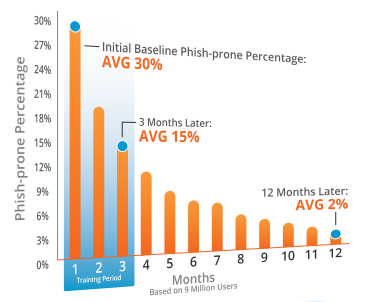What is managed security Awareness training?
Kevin Mitnick Security Awareness Training specializes in making sure your employees understand the mechanisms of spam, phishing, spear phishing, malware, ransomware and social engineering and can apply this knowledge in their day-to-day job. The best part is we manage it all for you. We setup the training and phishing campaigns and provide you with the detailed reports so your time is better spent elsewhere.
Baseline Testing
We provide baseline testing to assess the Phish-prone percentage of your users through a free simulated phishing attack.
Train Your Users
The world’s largest library of security awareness training content; including interactive modules, videos, games, posters and newsletters. Automated training campaigns with scheduled reminder emails.
PhishYour Users
Best-in-class, fully automated simulated phishing attacks, thousands of templates with unlimited usage, and community phishing templates.
See The Results
Enterprise-strength reporting, showing stats and graphs for both security awareness training and phishing, ready for management.





